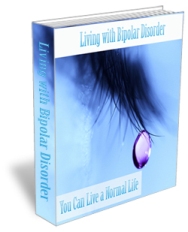|
Bipolar Disorder Guide
Bipolar Disorder Articles
Home
A Bipolar Disorder Checklist to Identify the Symptoms
A Bipolar Disorder Diagnosis is Difficult to Make
A Bipolar Quiz Helps Diagnose if the Disorder is Present
A Bipolar Test Will Identify the Severity of the Disorder
Bipolar Disease Has Many Extreme Levels
Bipolar Disorder in Children Can Present Different Than in Adults
Bipolar Medications Must be Carefully Monitored
Bipolar Symptoms For the Awareness of the Bipolar Disorder
Bipolar Treatment Through Medication and Counseling
Dealing with Bipolar Disorder Takes Time and Patience
The Behaviors of Bipolar Disorder are Disruptive to Everyone
The Chemistry of Bipolar Disorder is an Ongoing Study
The Family Suffers When a Mother Has Bipolar Disorder
The History of Bipolar Disorder Shows It Has Always Existed
The Relationship of Bipolar and Depression
The Types of Bipolar Support Programs That Can Help

CLICK
HERE
To Learn More
Related Links
HealthDuties
|
Bipolar Medications Must Be Carefully Monitored
There are many types of bipolar medications used to treat bipolar disorder which is a type of mood disorder
that is characterized by depression, manic episodes and sometimes accompanied with severe complications
like hallucination and delusion. Although, the disorder cannot be completely cured, treatment can be administered to
patients. It helps in providing relief from the problems and long-term management and prevention of the manic
phases.
Doctors prescribe various types of bipolar medications for the disorder. The main types consist of mood
stabilizers, anti-depressants and anti-psychotics. Many patients will go into a manic phase triggered by an
anti-depressant. The prescribing physician will be monitoring the patient for this condition. Apart from these
medicines, patients may be prescribed drugs that provide relief from insomnia, anxiety or restlessness, triggered by the
disorder. The 3 main types of bipolar medicines affect the neurotransmitters in the brain, which alter the functioning of the
brain cells and are effective in controlling the acute manic phases and depressive episodes experienced by the
patients.
Mood stabilizers like lithium, sodium valproate and carbamazepine are used to curb acute manic episodes
and they also help prevent the occurrence of the manic phases. Depression can also be effectively controlled with these
medicines. Lamotrigine, another mood stabilizer, can be effective during a depressed phase of bipolar disorder. Apart from these,
medicines like Gabapentin and Topiramate can also help patients.
The bipolar
medications are incomplete without the use of antidepressants, which are generally
administered along with the mood stabilizers. Bupropion, Paroxetine, Sertraline, Venlafaxine etc. are some of the common
medicines used as anti-depressants. Antipsychotic medicines are used to control hallucinations or delusions, which are often
experienced by patients in the acute stage of the disorder. Some of them are Olanzapine, Quetiapine, Clozapine etc. They can also
be administered at early stages of the disorder to control such problems as insomnia and anxiety.
Medication for bipolar disorder should not be discontinued without permission from the doctor. Since most of
the medicines have preventive qualities that stop the occurrence of manic episodes, they should be continued for long periods of
time. However, special care must be taken while prescribing medicines for children, pregnant women and elderly people diagnosed
with the disorder.
The bipolar medicines taken by children should be closely monitored by parents and other people
taking care of the child. Elderly people sometimes, may have other diseases or may be sensitive to certain medicines. So it
becomes absolutely necessary to thoroughly conduct tests before administering any kind of medicine for them. Similarly pregnant
women need to take medicines carefully since it’s likely to have a direct effect on the unborn child.
Since the bipolar disorder cannot be cured completely with bipolar medications, psychotherapy is often
used along with alternative treatment methods such as meditation, light and dark therapy etc.
|